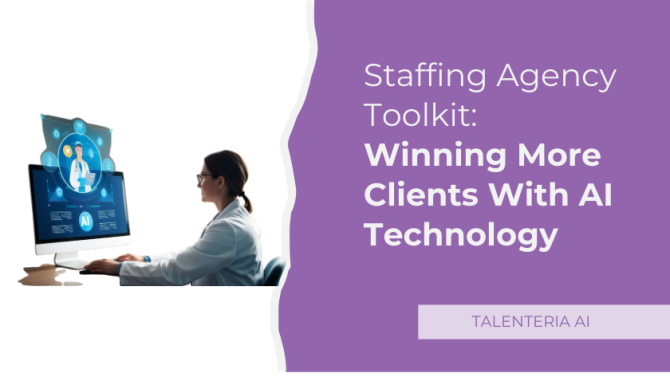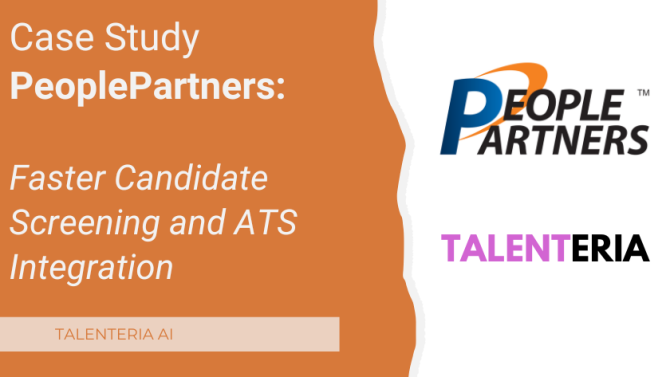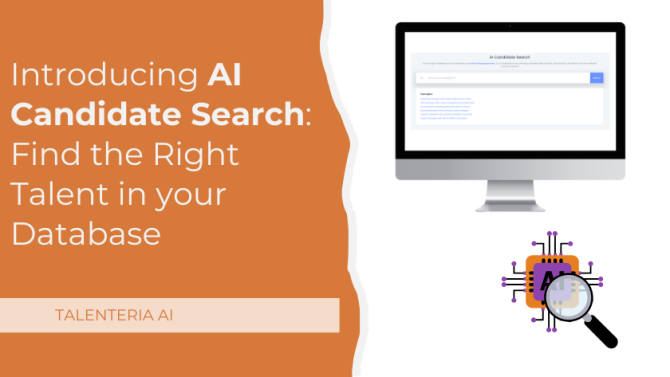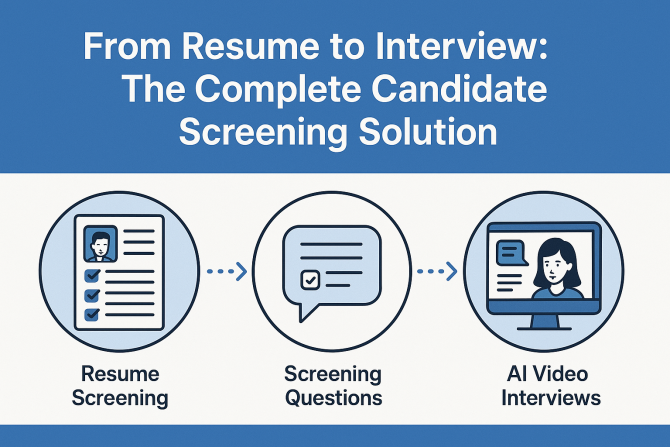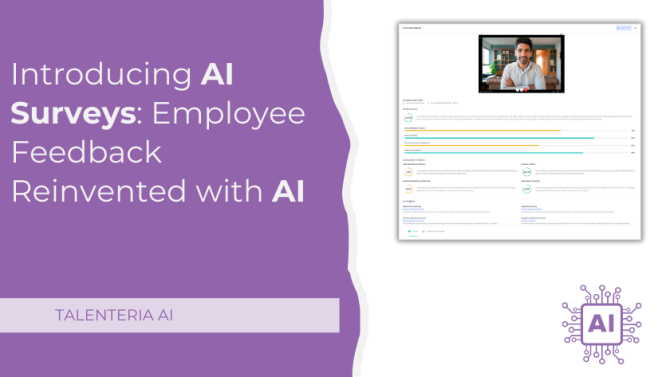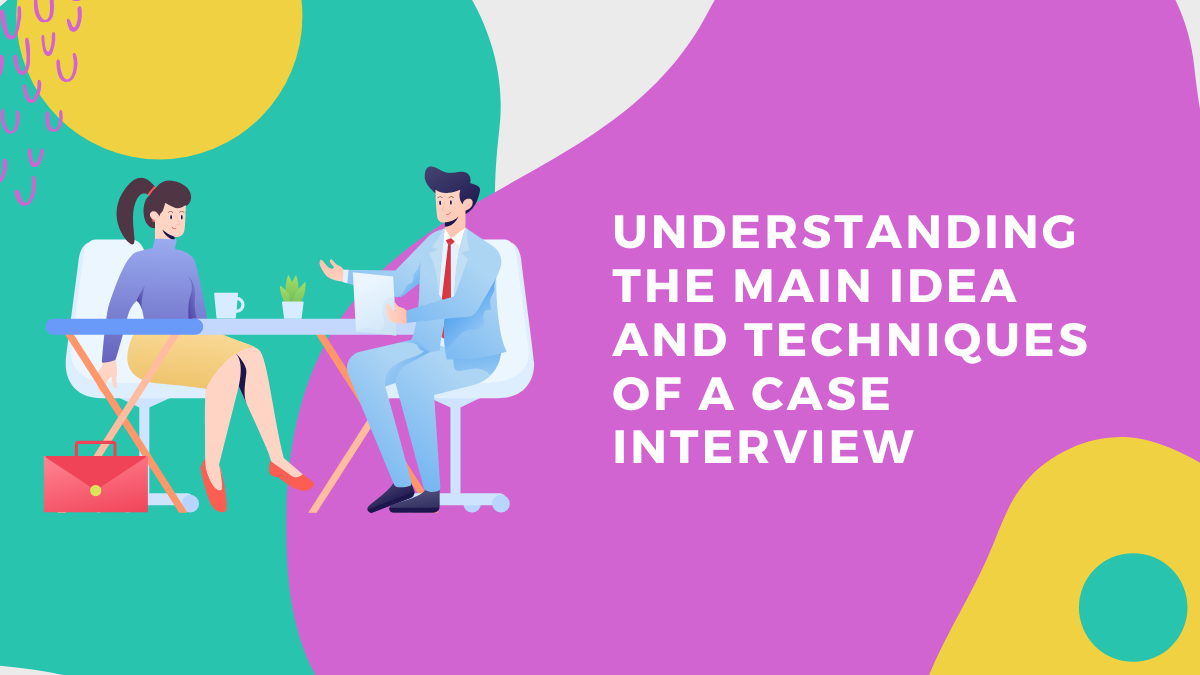
What Is a Case Interview?
Over the past few years, the case interview candidate assessment technique has become widespread. A potential employee may be asked to prove themselves in a hypothetical situation, evaluate it, and find an effective solution to it. Case interviews have a number of advantages over traditional methods of assessing applicants, which we will examine closely in this guide.
In addition, the cases correspond not only to essential professional skills but also to soft skills and personal qualities - like motivation, creativity, and responsibility. The point of a case interview is to get an idea of what extent a candidate's decisions coincide with the ones that have actually been made in real life.
It should be noted, however, that a consulting case interview cannot completely replace the usual questions, but it might be a good addition to a regular job interview.
Many employers have already implemented this type of job interview into their hiring routine, so our guide mainly focuses on case interviews from a candidates' point of view. Nevertheless, if you are looking for a way to start using them often, it is a good idea to consult Talenteria to know more about how these interviews work.
Consulting Case Interview Definition
First of all, a case is when you take a problematic situation taken from the company's experience and suggest different solutions.
In turn, a case interview – also known as a situational interview – is a job interview in which the candidate is presented with a challenging hypothetical business scenario that they will have to investigate and propose a solution to. It allows the employer to obtain information that cannot be extracted from the applicant's resume.
The main disadvantage of case interviews is the likelihood of drawing the wrong conclusion based on the candidate's answer. Before starting it, it is important to determine which skill or quality of the applicant the employer is interested in in the first place. Otherwise, the latter could be easily distracted by extraneous information, and that may lead to a false impression altogether. So, ideally, one particular case should correspond to one particular skill.
For example, consulting firms are generally looking for a certain skill set to be demonstrated by an applicant in a situational interview. This skill set includes:
- Problem structuring
- Logical thinking
- Analytical thinking
- The ability to make conclusions based on data
- The ability to synthesize your conclusions
1. Problem Structuring
Problem structuring is breaking a very serious problem into smaller pieces that are easier to study, analyze, and solve.
You should be able to back up your suggestions with some information. So, the thing that employers want to check during a consulting case interview is not how you would solve the issue - but rather how you would structure it, so it can be easily analyzed.
It is recommended to break a problem into the following pieces:
- What do the clients really need? ("Clients")
- How are competitors coping? ("Competitors")
- What should be done about this? ("Data-Based Solution")
This is an example of problem structuring. The better you know your customers' needs and how competitors are solving this particular issue, the faster you will find a solution to it yourself.
So, your ability to structure a problem is one of the most important things the employer will be paying attention to during your consulting case interview.
2. Logical Thinking
Here, you need to prove your point of view and give an explanation as to why you think the solution you have found for the case is the right one. Logical thinking is very important.
3. Analytical Thinking
Analytical thinking refers to searching for a solution to a particular problem in a systematic way. Also, a very common part of a case analysis is looking for the direction of change.
Analytical thinking helps understand how big the categories of competitors are and how many competitors are in every one of them. This information helps you find quality information on what competitors of each category are doing. This is what analytical thinking is about.
As a consultant, you're entitled to do a certain number of duties every day. You analyze some aspect of a case and use analytical thinking to inform your questions, collect data, and perform calculations to figure out the answer to your question.
However, it isn't always that easy. There are situations where you cannot do a data export from a firm to build financial models. Consulting case interviews mimic these situations. You ask a question, set what analysis you want to conduct, and ask the interviewer, "Is there any data related to this particular topic?" If you ask the right questions, the interviewer will provide you with this data.
A lot of cases are based on real-life interactions that the interviewer has worked on. So, the test that you need to pass has already been completed. You may even ask if the case is true and, if it is, what exactly was done.
4. Drawing Fact-Based Conclusions
This term is often used at companies like McKinsey. Fact-based conclusions are based on evidence that has been collected during the course of the case. In a situational interview, this happens when you ask questions or ask the interviewer if they have data on something.
Consultants value fact-based conclusions because most consulting companies have enough opinions as to what the firm should do to succeed in a given industry. The problem is that many of those opinions contradict each other, and you cannot do all of them. As such, McKinsey, Bain, BCG, and other consulting firms quite often choose a direction based on evidence and facts.
What the employer wants to see is your ability to draw out the wrong subconclusions as well as final conclusions. You have to link back to specific information that supports your conclusion. This is one of the most important skills you need to be a good consultant.
5. Synthesis
Synthesis means summarizing an entire case that leads you to a conclusion and a recommended course of action. The synthesis digests these facts and develops an understanding of what the client should do and why they should do it.
Synthesis goes far beyond mechanical generalization and provides action-oriented insights and recommendations. The employer will be looking for your ability to do that.
- Can you draw a conclusion from all the information you have collected and analyzed?
- Can you find something the client needs to do or any observation that might seem a little contradictory that you have ascertained based on the information?
- Can you clearly and concisely state this recommendation to the client?
This is the final step in the synthesis: state your findings, actions, or recommendations in a client-friendly way.
In the synthesis part of the case, the interviewer looks at how you express your summary, conclusions, and recommendations to them. They are trying to picture you delivering the same conclusion and recommendations to a customer.
They want to make sure you can speak with senior management in a very confident, clear, direct, and concise manner. This is the skill they seek in synthesis. And this is what they are looking for in general.
What Is the Difference Between a Consulting Case Interview and a Regular Job Interview?
While a consulting case interview and a regular interview have a lot in common and both serve as job interviews, they are fundamentally different for one reason: each part of a case interview is designed to reflect a certain aspect of the workplace experience to find the best potential consultants.
There is a reason that case interviews have been around for many years. It is the most effective way to find the most capable and competent employees. As a job seeker, you need to realize that your interview's only goal is for the employer to see how well you might be able to communicate with your future clients. Once it's clear, you will know exactly how to prepare for your consulting case interview properly.
Don't think like a candidate – think like an already hired employee. Answer the questions as if they were asked by a real client and not by a hiring manager.
In order to get more chances to be considered for the role, candidates should not only stand out in terms of answering evaluative or analytical questions, but they also need to demonstrate their soft skills as well. In other words, the applicant should not be rude, disrespectful, or unenthusiastic. Both work experience and interpersonal skills are essential for the success of a potential employee.
Interviewers tend to test analysis skills by observing an applicant's ability to ask thought-provoking questions, analyze information, use their creativity, draw the right conclusions. Additionally – and, hopefully, that's no news to you – they also want to know if or how nervous you become during a case interview. When it comes to communicating with customers and clients a lot, a lack of confidence is definitely not what you need.
A client may lose all interest in working with you and your company if they notice your nervousness. They might even start to question your qualifications and doubt your recommendations.
So try to always think like a hired worker and remember why case interviews are there in the first place – to mimic the job experience.
Who Uses Consulting Case Interviews and Why?
Case interviews are often used by consulting companies to assess candidate's problem-solving and analytical abilities before hiring them. BCG, Bain, LEK, Deloitte, PwC, McKinsey, Oliver Wyman – all these firms implement case interviews into their hiring routine.
Sometimes, applicants wonder why consulting companies love situational interviews so much. Well, basically, the main goal of a consulting case interview is to make sure you can adequately handle real-life business problems. Candidates go through the rigmarole of questions to show that they are up to the task, whatever it may be.
During the preparation process, some applicants look through numerous cases to be prepared for unexpected questions or unusual scenarios. The interview itself will seem much easier if you take the time to analyze as many possible cases as you can.
Everything you do during your situational interview should convince the employer that you are perfectly suitable for the role. Remember that the interviewer is testing not just your problem-solving skills but also your soft skills. To demonstrate your willingness and interest in working for the company, ask a few follow-up questions, evaluate the data carefully, and draw evidence-based conclusions.
The interviewing team will try to discredit you in order to see your reaction. If you are feeling like that's what is happening, just stay calm and put yourself together. Do not ever be rude or disrespectful to your potential employer. Do not doubt your answer while making a point because the employer does not want to hire an insecure consultant.
Case Interviews vs. Behavioral Interviews
Management consulting requires both analytical skills and soft skills because customers demand both. Successful consultants are good at both analysis and communication. This is an uncommon mix of skills that interviewers look for since these disciplines are very different.
Let's put it this way: to work on analytical skills, you have to develop the left part of your brain, and in order to gain interpersonal leadership skills, you will need the right half.
Because this combination is hard to come by, companies like McKinsey will be considering thousands of applicants just to hire a hundred people a year.
The goal of the consulting case interview is to create a simulation to test your business analysis skills. The idea behind this is that if you can successfully demonstrate these analytical skills in a simulated client situation, you are more likely to do the same in a real client situation. But keep in mind that business analysis is only one aspect of the management consulting role.
Another important aspect is customer interactions. Clients are usually in a state of huge disagreement about what to do next, and you are at the center of it.
It is quite common for young clients to be angry with you or feel threatened by your presence. They may be reluctant to help you, or they may not feel like you have any valuable recommendations to contribute compared to their 30 years of experience in the industry. So, it is very important to be able to behave well in such situations, because if you don't, it will reflect very poorly on the whole company.
The premise of a behavioral interview is that your previous track record is an indicator of your future performance. The employer will ask for examples from your work history in which you had either impact as a leader or interpersonal conflict resolutions. Your answers will show how well you interact with your coworkers, bosses, customers, or anyone else you work with every day.
Consulting case interviews and behavioral interviews are extremely different. If situational interviews are used to identify your analysis skills and predict your business capabilities, behavioral interviews help you demonstrate soft skills such as interpersonal leadership skills.
Both of these skill sets, however, are required to prove that you are capable of being successful in management consulting.
What Are the Types of Case Interview Formats?
In general, there are several different situational interview formats. The particular format depends on the company a candidate is being interviewed with and the specific round. Needless to say that the same thinking process applies to all formats of a consulting case interview – the employer will be looking for just one answer: is the potential employee skillful enough to be a good management consultant?
Interviewer-Led Format
An interviewer-led case interview has a well-structured format in which the interviewer – or the interviewing team – controls the focus, dynamic, and sequence of the problem-solving process.
Typically, you may be asked to give your opinion on why the profitability of a certain or even made-up firm is falling and propose solutions to it. Also, the employer might want you to estimate the market size of the industry and find ways to increase the company's revenue. And finally, you will have to prove your point of view and summarize your conclusion.
While all situational interview formats are designed to test the same problem-solving, analytical, and interpersonal skills, during an interview-led consulting case interview, you have to be prepared for a sudden change in style and remain confident if it happens. You must be able to move from one question to another quickly and unhesitatingly.
Candidate-Led Format
During a candidate-led situational interview, the potential employee is supposed to handle the entire case. The interviewer might want to hear your answer to an open-ended question like "What would you recommend your client to do if they are seriously considering a merger with their biggest competitor?" You will then have to lead the employer to a solution.
By doing this, the firm you are being interviewed for wants to see if and how you can handle the problem-solving process from start to finish all by yourself. Simply put, a candidate-led interview has less structure than an interviewer-led one.
Written Case Format
In any other format of a situational interview, you are supposed to come up with ideas yourself, request the information you need, and determine whether the given hypothesis is correct or not. In the written case, the data and hypothesis have already been put forward by somebody else, and your task is to test that hypothesis against the data.
A skill that is particularly tested during a written case interview is data interpretation. Your job as an employee is to collect data and find out if the hypothesis is correct, which is the main purpose of a written case interview.
Group Case
During a group consulting case interview, you complete the given case together with other candidates. Such a format is an accurate simulation of what a consultant's job would be like. As a consultant, you will work with a client as well as with other team members.
The skills that are tested with the help of a group case interview are interpersonal and customer management skills. If you are rude and disrespectful to your clients, your company's reputation might be damaged, and that is something that no firm wants.
Another thing the interviewer would like to check in a group case interview is whether you are a good teammate and are able to accept new ideas that you did not personally come up with. Other situational interview formats cannot test your communication skills; that's why group case interviews exist.
Presentation Case
In a presentation consulting case interview, you have a bit of time – usually one or two hours – to analyze the charts and data, develop a hypothesis, structure a problem, and make your conclusions. After you have done all of it, you have to present your findings to the interviewer in a slideshow.
This type of situational interview is focused on results, not processes.
Keep in mind that the employer will not relax and listen to your presentation with one ear open. Instead, they will be challenging every word you say and every statement and conclusion you make. This way, they want to know whether you can back up your own statements as if you were presenting your findings and recommendations to a client.
Regardless of the format of your interview, your main goal is to prove that you would be a great addition to the company as a consultant. But if you want to prepare for a particular format, take your time to do research to find out which type of a case interview is usually used by the company you are applying to.
What’s the Main Idea Here?
As mentioned earlier, situational interview questions are fundamentally different from traditional interview questions. In a behavioral interview, you most likely will be asked to tell the interviewer, for instance, how you resolved a conflict with your boss, client, or one of your teammates.
When it comes to situational interview questions, they lead you straight into a business case. They are typically focused on the customer, so the first part of the question is usually a little introduction to the customer's problem. The second part is the actual question: What would you recommend? How would you resolve the issue? What should the customer do?
A case interview serves as a way to find great consultants by simulating the working environment that the potential employee will have to face. Whatever you might hear or be asked during your situational interview, you will have to deal with it as a consultant on a day-to-day basis, including the questions themselves. So you should take the cases seriously and perceive them as part of your new job.
The main idea behind asking these questions is to give you a full insight into what your job as a management consultant will be like, and see if you will be good at it. That is why you are given real business cases – because the employer wants to understand how you will interact with a customer in a particular situation. They need to know that they can rely on you, trust you and that you will not harm their company's reputation once you are hired.
What Are Some Examples of Consulting Case Interview Questions?
Preparing for a number of consulting case interview questions, which can be easily found online, will help you better prepare for the situational interview. Demonstrating your confidence while maneuvering a case interview will show your interviewer that they can trust you to handle these issues with a real customer. You can use the following five examples of real case interview questions to get a better understanding of how case interview questions will be presented and the topics that they may cover.
Look at these questions in the context of how they would relate to business issues that customers face and not in the context of impressing your potential employer.
- What is the market capitalization of Apple today?
- How many automobiles are sold in Chicago each year?
- How would you redesign the Bank of America mobile app to make it more user-friendly?
- A company that produces mobile phones has found that it is operating at a loss despite its revenues being high. What could be the possible reasons for this?
- How many grocery stores are there in the United States?
Since you now understand what situational interviews are all about, the real work begins – developing a strategy to prepare for a case interview.
Whichever type of consulting case interview you are preparing for – learn to structure the question you are being asked. That will help you and the employer realize that you perfectly understand the scenario you are currently working on. Remember to include all the information and data you have been given. Your recap should not take longer than 2 minutes and must reflect your understanding of the company, the industry, and the decisions that the firm makes. Be confident and stay positive – that will be your interviewer's first impression of you.
What If You Need to Create Case Interview Questions?
If you are an interviewer rather than an interviewee, the above-mentioned questions would be an excellent starting point for your case interviews. For more information on case interviews and other facets of the recruitment process, reach out to Talenteria. Our state-of-the-art career site builder and recruitment marketing platform is an excellent tool for any HR manager.
